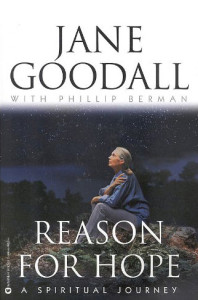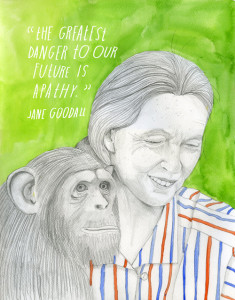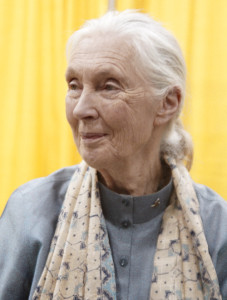Happy 80th Birthday, Jane Goodall: The Beloved Primatologist on Science, Religion, and Our Human Responsibilities
SPIRITUALITY, 7 Apr 2014
Maria Popova, Brain Pickings – TRANSCEND Media Service
What the chimpanzees teach us about the fine line between faith and apathy. 
Legendary British primatologist Jane Goodall (b. April 3, 1934) is celebrated not only as humanity’s greatest expert on chimpanzees but also as a remarkable mind that bridges the rigor of science with the sensitivity of spirituality. In a passage from her altogether fantastic 1999 exploration of science and spirituality, Reason for Hope: A Spiritual Journey (public library), which also gave us her gorgeous poem “The Old Wisdom”, Goodall reflects on a trying time in her life — her divorce in 1974, coupled with her quest to reconcile the faith in a higher power that she had harbored her whole life with the new understanding of and awe at evolution after her transformational experience of studying the chimpanzees at Gombe Stream National Park.
She writes:
Even if there was no God, even if human beings had no soul, it would still be true that evolution had created a remarkable animal — the human animal — during its millions of years of labor. So very like our closest biological relatives, the chimpanzees, yet so different. For our study of the chimpanzees had helped to pinpoint not only the similarities between them and us, but also those ways in which we are most different. Admittedly, we are not the only beings with personalities, reasoning powers, altruism, and emotions like joy and sorrow; nor are we the only beings capable of mental as well as physical suffering. But our intellect has grown mighty in complexity since the first true men branched off from the ape-man stock some two million years ago. And we, and only we, have developed a sophisticated spoken language. For the first time in evolution, a species evolved that was able to teach its young about objects and events not present, to pass on wisdom gleaned from the successes — and the mistakes — of the past, to make plans for the distant future, to discuss ideas so that they could grow, sometimes out of all recognition, through the combined wisdom of the group.
Echoing Mark Twain’s lament that we often use religion as a mask for human egotism, Goodall considers how these human capacities unfold beyond the intellectual and the spiritual to affect the very behaviors that shape our future and the responsibilities we have to our species, all species, and our precious shared planet:
With language we can ask, as can no other living beings, those questions about who we are and why we are here. And this highly developed intellect means, surely, that we have a responsibility toward the other life-forms of our planet whose continued existence is threatened by the thoughtless behavior of our own human species — quite regardless of whether or not we believe in God. Indeed, those who acknowledge no God, but are convinced that we are in this world as an evolutionary accident, may be more active in environmental responsibility — for if there is no God, then, obviously, it is entirely up to us to put things right. On the other hand, I have encountered a number of people with a strong faith in God who shrug off their own human responsibilities, believing that everything is safely “in God’s hands.” I was brought up to believe that “God helps those who help themselves.” We should all take responsibility, all play our part in helping to clean up and heal the planet that, in so many ways, we have desecrated.
Perhaps rather than disheartening, the awareness that we are, indeed, a cosmic accident is the most powerful gift we have.
_____________________________
Brain Pickings is the brain child of Maria Popova, an interestingness hunter-gatherer and curious mind at large obsessed with combinatorial creativity who also writes for Wired UK and The Atlantic, among others, and is an MIT Futures of Entertainment Fellow. She has gotten occasional help from a handful of guest contributors.
Go to Original – brainpickings.org
DISCLAIMER: The statements, views and opinions expressed in pieces republished here are solely those of the authors and do not necessarily represent those of TMS. In accordance with title 17 U.S.C. section 107, this material is distributed without profit to those who have expressed a prior interest in receiving the included information for research and educational purposes. TMS has no affiliation whatsoever with the originator of this article nor is TMS endorsed or sponsored by the originator. “GO TO ORIGINAL” links are provided as a convenience to our readers and allow for verification of authenticity. However, as originating pages are often updated by their originating host sites, the versions posted may not match the versions our readers view when clicking the “GO TO ORIGINAL” links. This site contains copyrighted material the use of which has not always been specifically authorized by the copyright owner. We are making such material available in our efforts to advance understanding of environmental, political, human rights, economic, democracy, scientific, and social justice issues, etc. We believe this constitutes a ‘fair use’ of any such copyrighted material as provided for in section 107 of the US Copyright Law. In accordance with Title 17 U.S.C. Section 107, the material on this site is distributed without profit to those who have expressed a prior interest in receiving the included information for research and educational purposes. For more information go to: http://www.law.cornell.edu/uscode/17/107.shtml. If you wish to use copyrighted material from this site for purposes of your own that go beyond ‘fair use’, you must obtain permission from the copyright owner.

